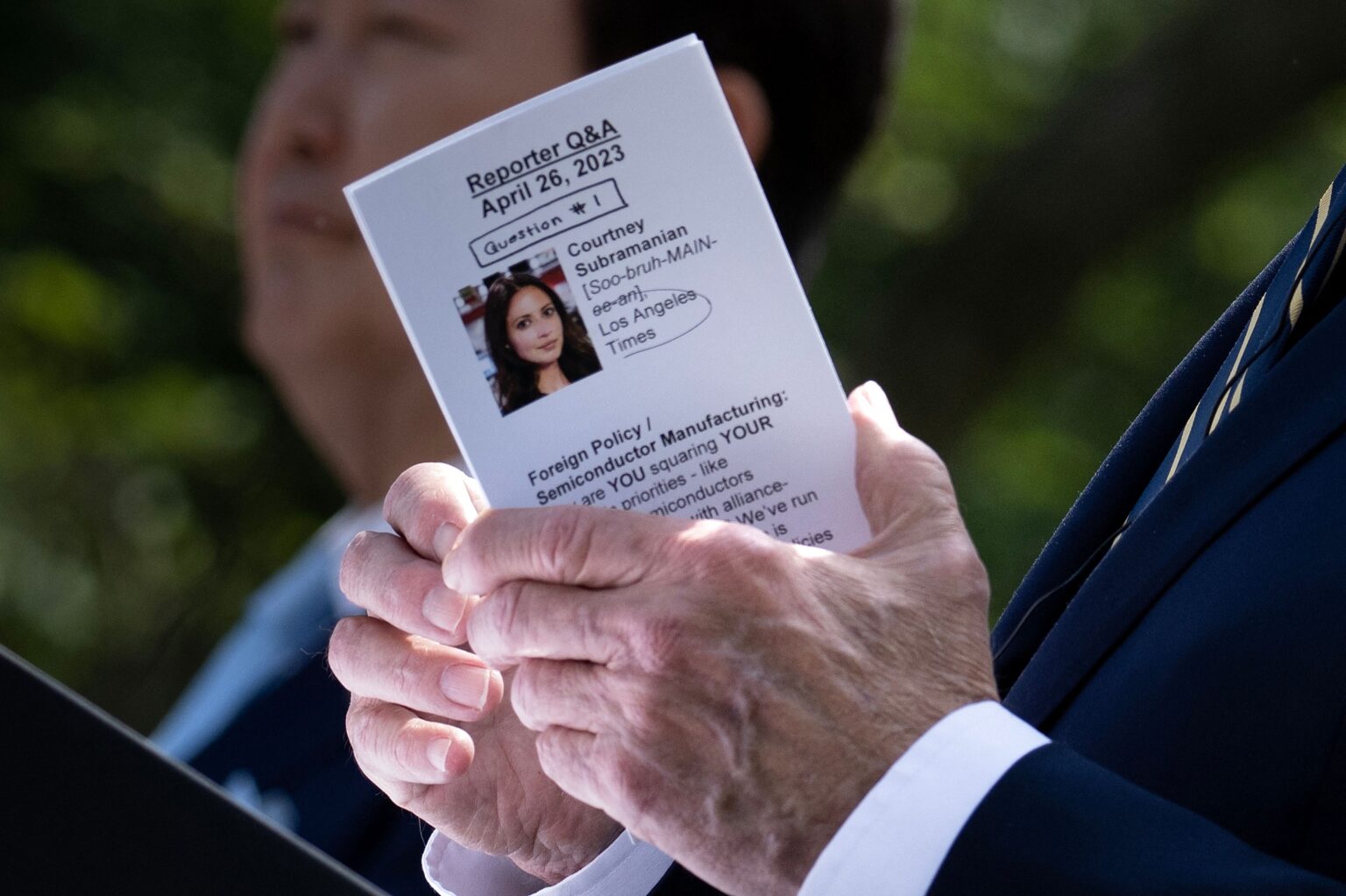President Biden was photographed holding a notecard Wednesday, revealing the stage managing behind many political media events
President Biden offered such a long and nuanced response to the first question he got at Wednesday’s White House news conference that it almost seemed he knew in advance what the reporter would ask.
As it turns out, he more or less did.
A photo of Biden holding a notecard during the presser may have inadvertently revealed one of the dirty little secrets of presidential news conferences: They’re less spontaneous and freewheeling than they appear to be, with a fair amount of stage managing behind them.
The card in Biden’s hand, titled “Question # 1,” clearly directs the president to call on a Los Angeles Times reporter, Courtney Subramanian. The card has Subramanian’s name (including a pronunciation guide for her surname), her affiliation and even a headshot.
More important, photos taken by an Agence France-Presse photographer show what Subramanian was likely to ask about. Under the heading “Foreign Policy/Semiconductor Manufacturing,” the card reads, “How are YOU squaring YOUR domestic priorities — like reshoring semiconductors manufacturing — with alliance-based foreign policy?”
Which is generally what Subramanian asked Biden about when he called on her at the joint news conference with South Korean President Yoon Suk Yeol: “Thank you, Mr. President,” she began. “Your top economic priority has been to build up U.S. domestic manufacturing in competition with China. But your rules against expanding chip manufacturing in China is hurting South Korean companies that rely heavily on Beijing. Are you damaging a key ally in the competition with China to help your domestic politics ahead of the election?”
How did Biden — or, more accurately, his press handlers — know that question was incoming, and know to call on Subramanian? The answer is because they asked her.
For many years, White House press office employees have routinely polled reporters about their priorities and interests in advance of news meetings to anticipate what their boss might be asked while on the podium. The practice is also common in news conferences with Cabinet secretaries, such as the secretary of defense and secretary of state.
“Every White House press office will try to go around and take the temperature” of reporters, said a veteran White House reporter, who spoke on the condition of anonymity because his employer had not authorized him to comment. “They want to look smart in preparing their boss for what we’ll throw at him.”
Press staffers as far back as the George W. Bush administration did so, he said. Presidents have tended to call on the reporters his aides have directed him to, he said. President Donald Trump was the most likely to go off script and take questions from anyone, though Trump also made a habit of calling on reporters from outlets he knew were supportive of him.
But in their advance conversations, reporters rarely offer anything as specific as Subramanian’s topic; the typical answer is “news of the day,” which leaves the options for questioning the president open. “You don’t want to give away your question,” said the veteran reporter. “It’s incredibly bad form to do that.”
Subramanian didn’t respond to a request for comment. A spokesperson for the Los Angeles Times, Hillary Manning, said Subramanian didn’t provide White House officials with a specific or even general question in advance of the news conference. However, on Tuesday, the reporter mentioned to officials that semiconductors were “one of several topics she might want to cover,” said Manning.
White House press secretary Karine Jean-Pierre, in her briefing Thursday, said officials didn’t receive a question from Subramanian before the news conference. She added, “It is entirely normal for a president to be briefed on reporters who will be asking questions at a press conference and [the issues] that we expect they might ask about.”
The White House also polls reporters before Jean-Pierre’s daily briefings, and before “gaggles” (informal gatherings with officials). The inquiries come via email or in person. Another reporter — who also spoke on the condition of anonymity because their employer hadn’t authorized them to talk about the topic — said a White House press staffer emailed them recently asking “if there were any topics in particular” that they wanted to explore at an upcoming gaggle.
While it’s unusual for a reporter to offer detailed and specific questions in advance, even vague suggestions can help shape the administration’s encounters with the news media.
Knowing that a reporter wants to ask about a topic the president wants to emphasize can help cull the list of who’ll be called on to ask a question in the first place. Conversely, it can act as an early-warning system, alerting the president to avoid a reporter who might raise an uncomfortable subject — say, Biden’s possession of classified documents or Republican efforts to emphasize the federal investigation of his son Hunter Biden.
As a rule, however, reporters say their pre-news-conference responses to these inquiries don’t preclude them from changing the subject and asking anything they want.
Nevertheless, the Republican National Committee’s research arm aimed to capitalize on the optics of Wednesday’s episode. Over a photo of Biden and the notecard, the organization tweeted: “Biden used a cheat sheet at today’s press conference — with a reporter’s question written on it.”
Source: Washington Post

